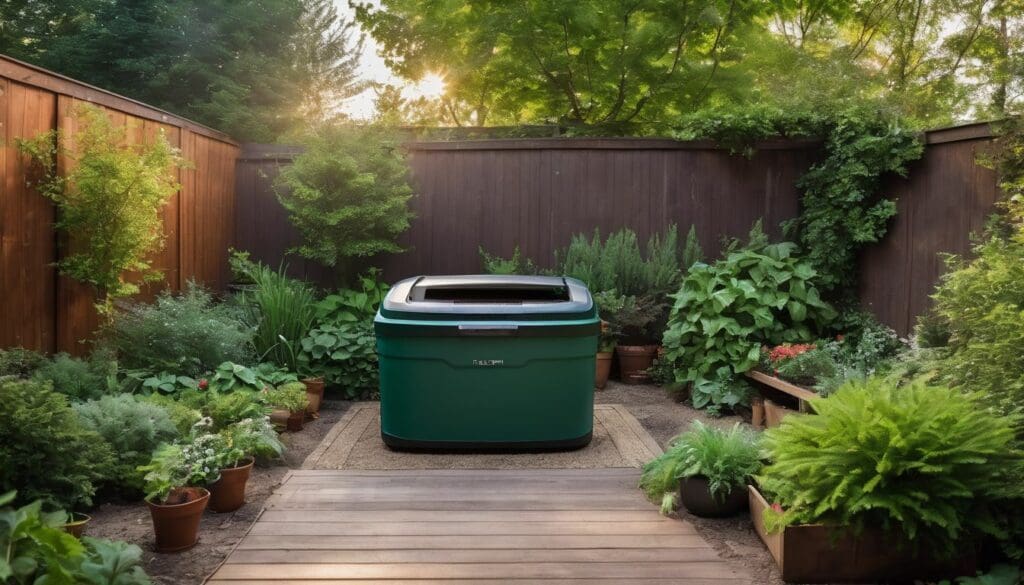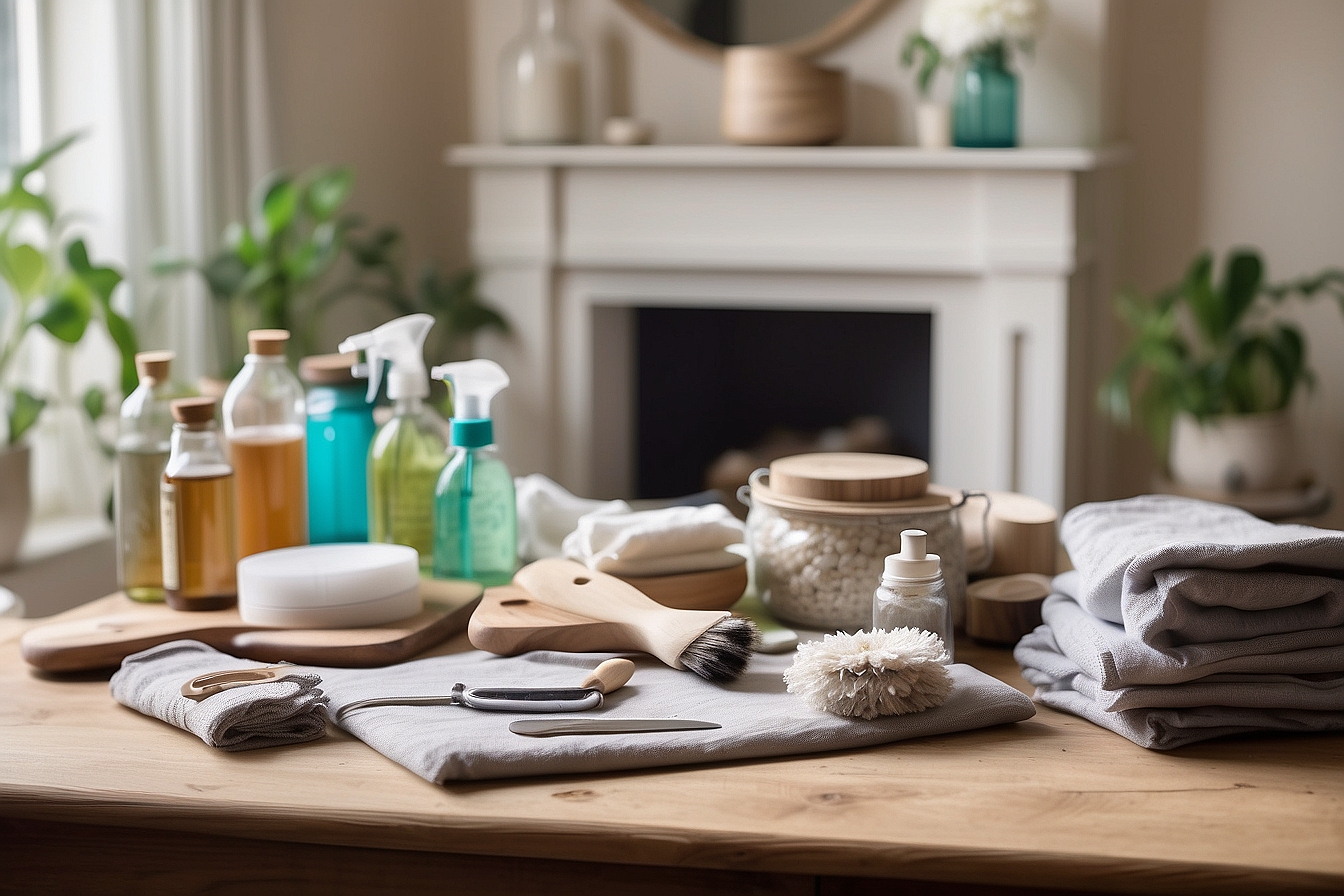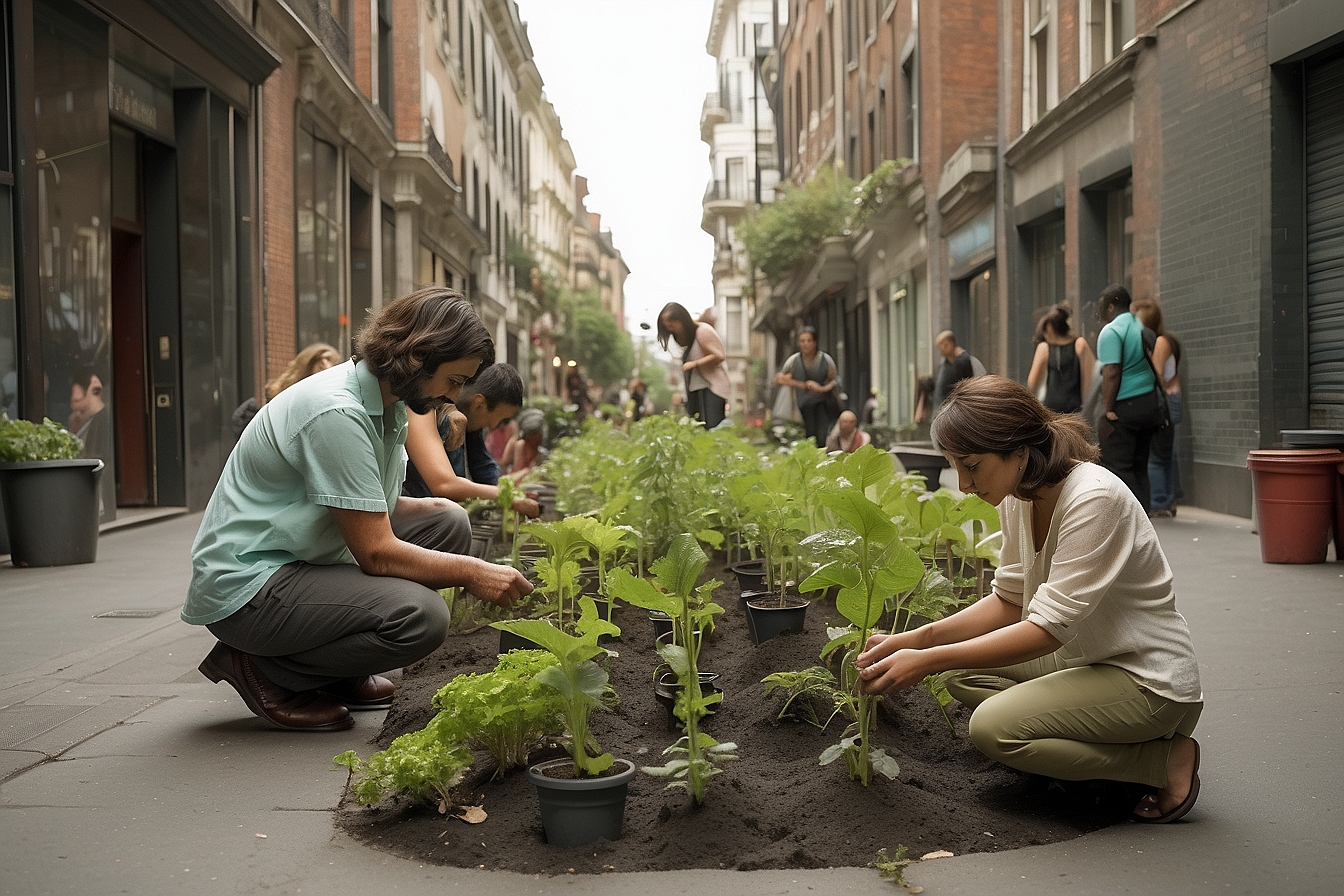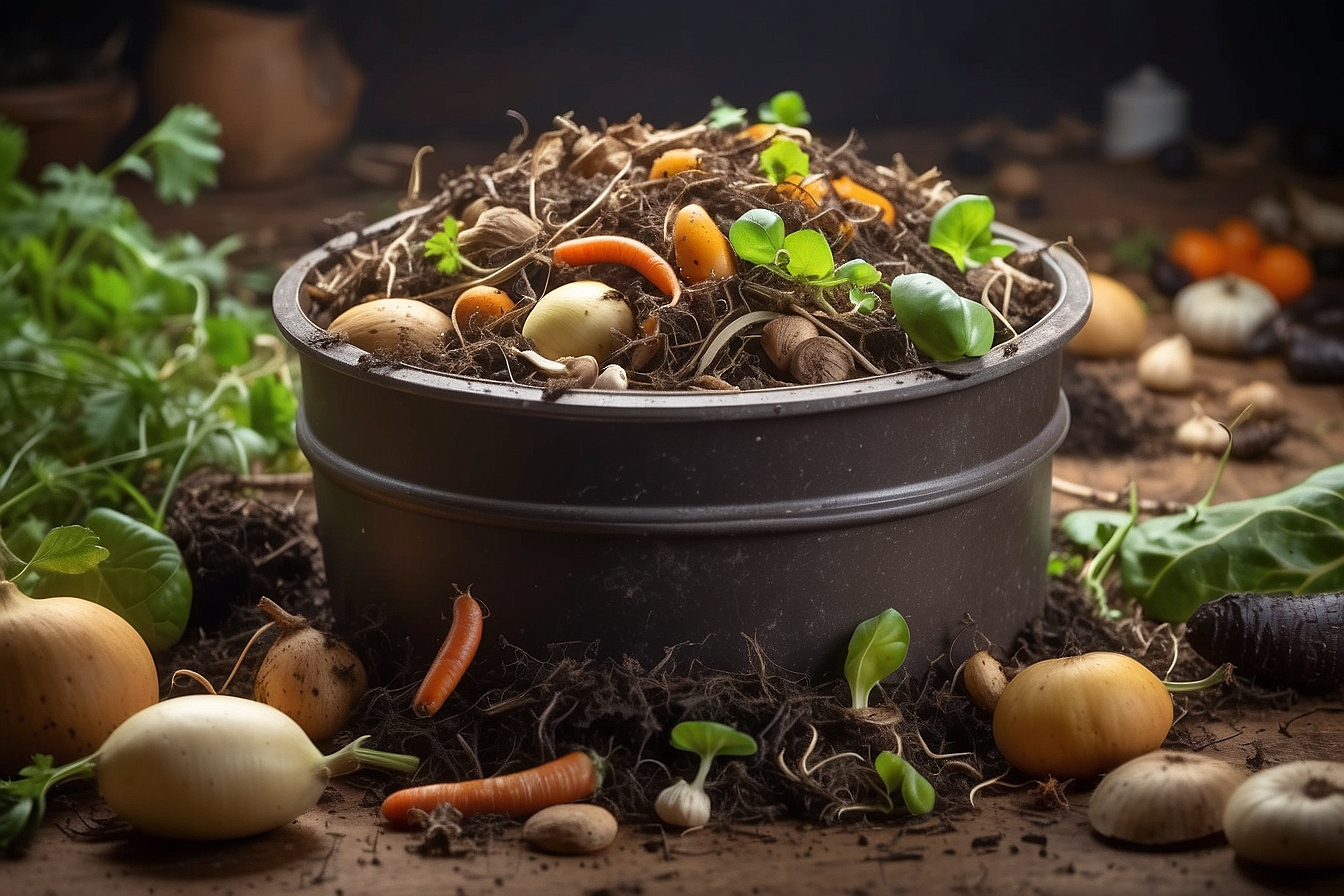Do you find yourself rather disheartened as your kitchen odds and ends, along with the remnants of your garden’s toil, swiftly fill up the bin? That sense of frustration is something many share.
It’s precisely why we’ve taken it upon ourselves to delve into composting with gusto. Our forthcoming article is brimming with handy advice that will guide you in transforming your organic leftovers into a nutrient-rich bonanza for your greenery—an absolute triumph for both you and Mother Nature.
Prepare to elevate what was once rubbish into a veritable treasure trove!
Key Takeaways
- Composting at home reduces green waste in landfills, lessens greenhouse gas emissions and provides a natural fertiliser for gardens.
- A successful compost pile needs the right balance of greens, browns, moisture, and air to help microorganisms break down organic material into soil-enriching compost.
- To create an efficient composting system, choose an appropriate bin type and add suitable materials like fruit scraps, coffee grounds, eggshells, yard waste and shredded paper.
- Regularly turning your compost ensures even oxygen distribution which speeds up decomposition while preventing odours and pests.
- Finished compost is ready when it has a dark crumbly texture and earthy smell; it can be used to improve garden soil health by spreading around plants or mixing into planting beds.
The Benefits of Composting at Home
Composting at home helps reduce green waste and provides a natural fertiliser for your garden. It’s easy, convenient, and an environmentally friendly way to manage organic waste.
Helps reduce green waste
By composting at home, we take a proactive step in reducing the amount of green waste that ends up in landfills. Every bit of organic matter we redirect from our bin to our compost bin counts.
We’re turning kitchen scraps and garden waste into valuable soil enrichment rather than letting it rot away in dumps. This not only shrinks the heft of our rubbish bags but also lessens the burden on municipal waste management services.
We make a real difference with backyard composting by transforming biological progression into something beneficial for our gardens. Leaves, grass clippings, and vegetable peelings transform through the decomposition process right within our reach.
It’s empowering to know that what could have contributed to greenhouse gas emissions is instead nurturing nutrient-rich soil for future planting endeavours. By managing green waste efficiently, we help curb pollution and contribute directly to natural fertiliser production – all from the comfort of our own homes.
Easy and convenient
Transitioning from reducing green waste to the inherent ease and convenience of home composting, we find that this sustainable practice doesn’t have to be complicated. By simply repurposing kitchen scraps and yard waste, we can effortlessly transform them into nutrient-rich soil for our gardens.
This process not only minimises organic matter decomposition in landfills but also provides an accessible means of recycling organic waste at home. The beauty of composting lies in its versatility – it’s a straightforward and practical way to contribute to green waste management while reaping the benefits of natural fertilisation for your garden.
Whether you’re short on time or space, there are numerous methods and containers available that suit varying lifestyles and needs. From traditional compost bins to vermicomposting setups, there’s an easy solution for everyone looking to make a positive impact on the environment while enjoying greener gardens.
Provides natural fertiliser
Composting at home provides nutrient-rich fertiliser for your garden. As organic materials break down, they create a natural source of essential nutrients that promote healthy plant growth.
This homemade fertiliser is eco-friendly and helps reduce the need for chemical-based products, supporting your commitment to environmental conservation.
Once the composting process is complete, you can use the finished product to enrich your soil and nourish your plants. The result is a sustainable and cost-effective way to improve the health of your garden while reducing waste and supporting a healthier environment.
The Art and Science of Composting
Understanding the composting process is essential for successful home composting. Knowing how microorganisms break down organic matter and create nutrient-rich soil will help you maintain a healthy and productive compost pile.
Understanding the composting process
To understand the composting process, we need to know that it’s all about nature doing its work. Organic waste is broken down by microorganisms like bacteria, fungi and other tiny creatures.
The key to successful composting lies in providing the right conditions for these microorganisms to thrive. They need a balanced diet of greens (like fruit and veg scraps) and browns (such as dried leaves and twigs), moisture, air, and warmth.
When these elements come together in the right proportions, the magic of decomposition happens naturally.
The role of microorganisms
Microorganisms play a crucial role in the composting process, breaking down organic materials into nutrient-rich soil. Bacteria, fungi, and other microorganisms thrive in the warm, moist environment of a compost pile, decomposing kitchen scraps and garden waste.
They speed up decomposition and transform the raw organic matter into a valuable resource for gardening.
These tiny organisms work relentlessly to break down tough plant materials and create beneficial by-products that enrich the soil. The decomposition process they drive results in humus – an essential ingredient for healthy gardens.
Understanding their vital role can inspire us to foster ideal conditions for them to flourish in our compost piles.
Setting Up a Compost Bin
When setting up a compost bin, it’s important to choose the right type of bin and know what materials are suitable for composting. Maintaining a healthy compost pile can ensure successful decomposition.
Choosing the right bin
When choosing the right bin for composting, consider a size that fits your space and needs. Ensure it has good ventilation and drainage, as airflow is essential for the composting process.
Look for durable material such as plastic or wood, and make sure it has a secure lid to keep pests out. A tumbling composter can speed up the decomposition process and requires minimal effort to turn.
Consider using multiple bins to separate different stages of composting or manage different types of waste. If you’re tight on outdoor space, an indoor worm bin could be a great option for processing kitchen scraps.
What to compost
When composting at home, we can add a variety of organic materials to create nutrient-rich soil for our gardens. Here’s what you can compost:
- Fruit and vegetable scraps: Including peels, cores, and seeds.
- Coffee grounds and filters: Adding these to your compost helps enrich the soil.
- Eggshells: Crushed eggshells add calcium to the compost.
- Yard waste: Such as grass clippings, leaves, and small branches.
- Straw and hay: They help aerate the compost pile.
- Shredded paper and cardboard: As long as they are not glossy or colored.
Tips for maintaining a healthy compost pile
Maintaining a healthy compost pile is crucial for successful composting. We have outlined some tips to help you achieve this:
- Regularly monitor the moisture levels in your compost pile to ensure it remains damp, but not waterlogged.
- Turn and aerate your compost regularly to promote decomposition and prevent unpleasant odours.
- Balance the carbon and nitrogen ratio by adding a mix of green and brown materials such as kitchen scraps and dried leaves.
- Avoid adding meat, dairy products, or oils to your compost pile as they can attract pests and slow down the decomposition process.
- Cover your compost pile with a lid or tarp to retain heat and moisture, aiding in the breakdown of organic materials.
Turning Your Compost
It’s important to turn your compost regularly to aerate the pile and speed up decomposition. Learn how to effectively turn your compost for optimal results! Read on to discover more tips for successful home composting.
Importance of turning
Turning your compost is crucial for the decomposition process. Regularly turning your compost pile ensures that oxygen is distributed evenly, allowing beneficial microorganisms to thrive and break down organic material effectively.
This process also prevents odours and helps maintain a balanced moisture level in the compost, creating nutrient-rich soil for your garden. Turning the compost every 1-2 weeks accelerates the decomposition process, producing usable compost more quickly.
Additionally, proper turning can prevent matting or compacting of materials in the pile, promoting aeration and preventing anaerobic conditions that can lead to unpleasant smells or attract pests.
How to turn your compost effectively
To turn your compost effectively, use a pitchfork or shovel. Lift and aerate the materials by turning them over in the compost pile. This helps to distribute air and moisture throughout the mixture, promoting decomposition. Turn your compost every 1-2 weeks to ensure all the organic matter breaks down evenly. Monitor the temperature of your compost pile after turning it; this can indicate whether it’s decomposing properly. Keep an eye out for any unpleasant odours, which may suggest that the compost needs more oxygen or additional materials. Observe how the materials are breaking down to gauge when it’s time to turn your compost again. As you turn your compost, check for signs of pests or rodents and address any issues promptly.
Troubleshooting and Using Your Compost
If you encounter any issues with your compost, we’ll help you identify and solve them. Learn how to know when your compost is ready to use and discover the many ways to incorporate it into your garden.
Read more about troubleshooting and using your compost to make the most of your home composting efforts.
Identifying and solving issues with your compost
To maintain a healthy compost pile, it’s important to identify and solve issues that may arise. Here are some common problems you may encounter and how to address them:
- Foul Odor:
- Turn the compost more frequently
- Add dry materials like straw or paper to balance moisture levels
- Pests:
- Keep food scraps buried beneath the surface
- Use a tight – fitting lid on your compost bin
- Slow Decomposition:
- Ensure proper balance of green and brown materials
- Chop larger items into smaller pieces for faster breakdown
- Excess Moisture:
- Add more dry materials like leaves or shredded newspaper
- Increase aeration by turning the pile more often
- Unpleasant Smell:
- Avoid adding meat, dairy, or oily foods to the compost
- Ensure proper airflow within the compost bin
How to know when compost is ready to use
When compost is ready to use, it will have a dark, crumbly texture and an earthy smell. You can also look for the absence of recognisable food or garden waste in the compost. To check if the compost is ready, grab a handful and squeeze; if water drips out, it needs more time to decompose.
Another way to test readiness is by placing a few seeds in the compost; if they germinate quickly, then the compost is rich and ready for use.
Once you’ve confirmed that your compost is ready, you can spread it over your garden as a natural fertiliser or mix it with soil for planting. Utilising finished compost enriches your soil with nutrients and promotes healthy plant growth.
Ways to use finished compost in your garden
Using finished compost in the garden enriches the soil, provides necessary nutrients, and aids plant growth.
- Spread a layer of compost around the base of plants to nourish them and suppress weeds.
- Mix compost into the soil when planting to improve its structure and water retention.
- Create a compost tea by steeping finished compost in water, then use it as a liquid fertiliser for your plants.
- Use compost as a top dressing for lawns to boost soil health and promote healthy grass growth.
Conclusion
Using finished compost in your garden can significantly enhance the soil’s fertility, leading to healthier and more robust plant growth. By incorporating nutrient-rich compost into your gardening routine, you are not only reducing waste but also promoting a sustainable and eco-friendly approach to nurturing your plants.
The benefits of home composting extend beyond the individual gardener – it contributes towards a broader environmental conservation effort by minimising organic waste sent to landfills and reducing the need for chemical fertilisers.
Composting at home is an art that holds numerous rewards for both the environment and the individual. In understanding the process, setting up a healthy pile, turning it regularly, troubleshooting issues, and finally utilising the rich compost in our gardens, we become active participants in promoting a greener planet.
FAQs
1. What is composting at home?
Composting at home is recycling your green waste, kitchen scraps, and garden refuse into nutrient-rich soil through a natural process called microbial decomposition.
2. How does composting benefit my garden?
By composting you turn organic waste into valuable compost that adds nutrients to your soil, helping your plants grow better.
3. Can all kitchen waste go into the compost bin?
Mostly yes! Fruit and vegetable peelings, coffee grounds, and eggshells can go in but avoid meat or dairy items as they attract pests.
4. Is it hard to start composting in my backyard?
It’s quite simple! Start by gathering your green waste and kitchen scraps in a bin and let the decomposition process do its magic over time.





